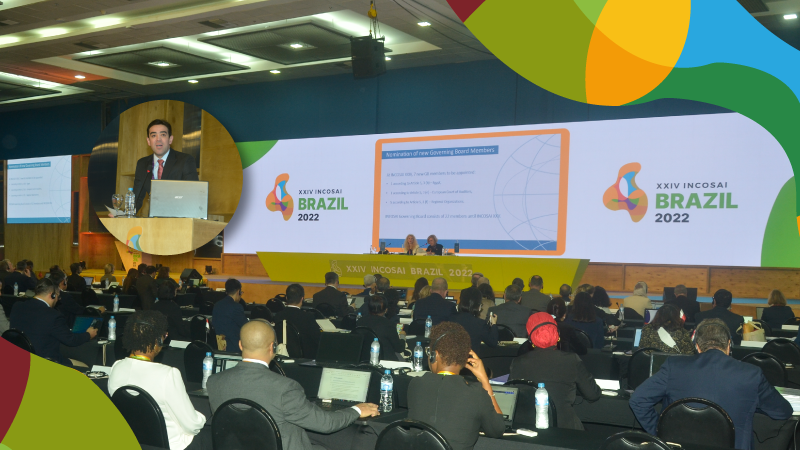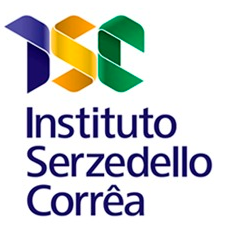Tribunal de Contas da União
INTOSAI's Governing Board approves digitalization of the auditing standards framework.

The 76th meeting of the Governing Board of the International Organization of Supreme Audit Institutions (INTOSAI), held in Rio de Janeiro on November 8, was marked by the approval of the digitalization proposal of the INTOSAI Professional Pronouncements Framework (IFPP). The achievement is the result of the so-called Component 1 research, led by the European Court of Auditors (ECA), with the support of the Professional Standards Committee (PSC), chaired by the Brazilian Federal Court of Accounts (TCU).
After two years, the work done to better understand how users accessed the international auditing standards and what problems they encountered required a great deal of planning effort, discussions, workshops, and questionnaires with the public. Among the problems that were identified were the duplication of documents and contradictions between standards on the same topics, as well as difficulties in subject retrieval and the use of cross-references, which went beyond the need to update.
The president of the TCU, minister Bruno Dantas, said that "This is an important instrument to ensure the quality of the INTOSAI standards. With clarity and coherence, the process will improve accessibility and search functions" and will reach users of the next generation, the minister pointed out, emphasizing the importance of the decisions approved at the meeting. And he assured that the "meeting of the Governing Board is a high point in INCOSAI's preparations. "The decisions we take here have a direct impact on the issues that will be deliberated in the general plenary sessions of our summit," said Dantas.
For the vice-president of the TCU, minister Vital do Rêgo, the approval of the digitalization of the auditing standards framework is an important achievement for the organization. "We have to make technology work in our favor. Of all the issues we brought here today, this is the one that will bring the greatest impact and benefits."
Minister Vital do Rêgo also remembered that INTOSAI has grown in recent years and changes are essential for the organization's evolution. "INTOSAI is growing a lot within two major concepts. The global voice, that is, to make INTOSAI really an organization that represents the entire global control world and, in fact, to be prepared for the great world crises, economic, sustainability, climate, and health crises that are commonplace, therefore, the need for our control networks to be prepared to face them."
During the meeting, the TCU also approved the terms of reference of the task force that will review and update the INTOSAI communication policy. The work will be led by Brazil with the support of the organization's General Secretariat. In addition, the initiative of the TCU and the Saudi Arabian Supreme Audit Institution to encourage academic research in areas that are of interest to SAIs was approved.
New framework of standards
The proposed new standards framework considers four axes: clarity, robustness, accessibility, and relevance, which are the four main guides for the team to develop a clearer standards framework for the user. "Many SAIs feel that repetitions get in the way of the clarity of the standards framework. In addition, it is already the consensus of everyone that our standards framework is outdated, after all, printable PDF documents are no longer part of everyday reality. We urgently need a digital presentation of the standards and all the benefits this provides," concluded Minister Bruno Dantas.
INTOSAI’s Governing Board
The INTOSAI Governing Board meeting takes place annually and, every three years, is held before the official opening of the General Assembly of Supreme Audit Institutions (INCOSAI). It is during this meeting that all INTOSAI's strategic and administrative decisions are made, with immediate effect and endorsed every three years.
This Board is composed of 22 members elected at the previous INCOSAI. In addition to them, the heads of the regional organizations also participate. This year, the meeting was chaired by the Secretary General of INTOSAI, Margit Kraker.
TCU's action in the PSC
During the meeting, four new international auditing standards were also approved, totaling 15 approved standards in the period from, when Brazil, through the TCU, chaired the PSC and assisted the other committees and INTOSAI bodies in the development of the work. Three of the new standards will also serve to guide the professionalization of the TCU's employees in the development of their competencies.
What INTOSAI's Governing Board does
Among the attributions of INTOSAI's Governing Board are:
- review and approve INTOSAI's statutes and strategic plan before approval by the Congress;
- monitor the execution of the strategic plan;
- approve the terms of reference and leadership of INTOSAI's goal committees;
- determine whether the qualifications of higher control institutions and other bodies (in the case of an application from an Associate Member or Affiliate Member) wishing to join INTOSAI meet the admission requirements and decide on their admission;
- recognize regional organizations;
- constitute committees and appoint their chairs;
- approve the triennial budget, including any recommendations for the readjustment of Members' dues;
- approve the annual budgets, also in view of the implementation of INTOSAI's strategic plan;
- approve the necessary actions in case of accumulated surplus as established in INTOSAI's financial regulations and rules;
- review and approve the annual report of the general secretariat and submit it to the Congress for endorsement.
Members of the Governing Board and the representatives of the regions
|
1 |
President |
Aleksei Kudrin |
Russian Federation |
|
2 |
First Vice-President |
Bruno Dantas |
Brasil |
|
3 |
Second Vice-President |
Hussam bin Abdulmohsen Alangari |
Saudi Arabia |
|
4 |
General Secretary |
Margit Kraker |
Austria |
|
5 |
Member |
Abdelkader Benmarouf |
Algeria |
|
6 |
Member |
Jesús Rodríguez |
Argentina |
|
7 |
Member |
Terrance Bastian |
Bahamas |
|
8 |
Member |
Kai Hou |
China |
|
9 |
Member |
Girish Chandra Murmu |
India |
|
10 |
Member |
Yuji Morita |
Japan |
|
11 |
Member |
Junias Etuna Kandjeke |
Namibia |
|
12 |
Member |
Karl Eirik Schjøtt-Pedersen |
Norway |
|
13 |
Member |
Nelson Shack Yalta |
Peru |
|
14 |
Member |
Marian Banaś |
Poland |
|
15 |
Member |
José Tavares |
Portugal |
|
16 |
Member |
Fuimaono Camillo Afele |
Samoa |
|
17 |
Member |
Tsakani Maluleke |
South Africa |
|
18 |
Member |
Chanathap Indamra |
Thailand |
|
19 |
Member |
Harib Saeed Al Amimi |
United Arab Emirates |
|
20 |
Member |
Gene L. Dodaro |
United States of America |


